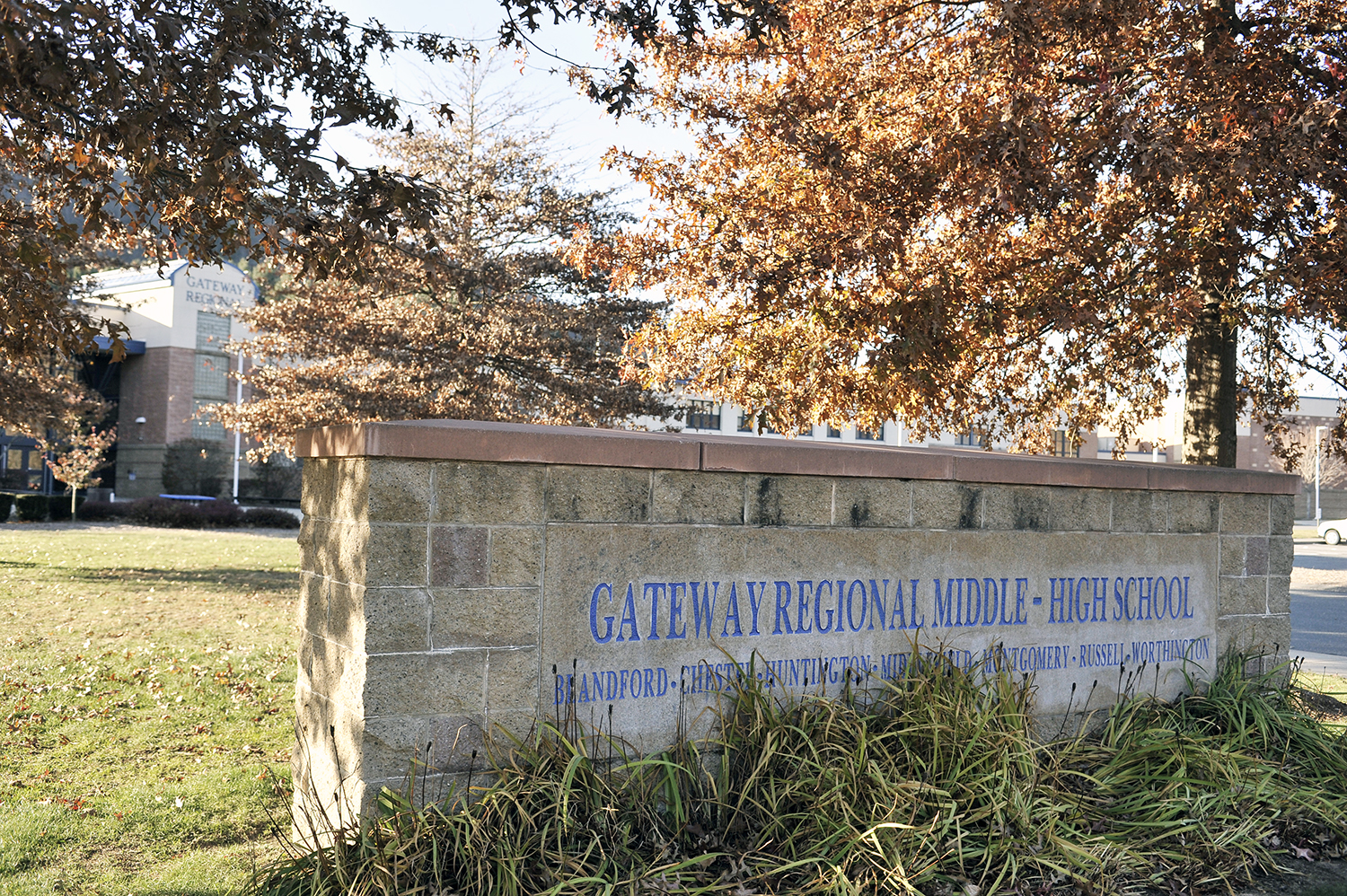HUNTINGTON – The Gateway Regional School Committee meeting last night featured District Superintendent Dr. David Hopson giving a state of the district address of sorts, using a smart board to lay out the district’s proposed $16.4 million budget. He also asked members to weigh in on how the district should choose to cope with the loss of the town Worthington from the district and how they can make up a potential $1.07 million loss in revenue related to that.
“Our time is growing short as always,” said Hopson of the timeline for making crucial budget decisions. “We haven’t received any indications from the governor about what his budget is going to look like other than he’s looking at a $1.5 billion deficit in his budget.”
Hopson referenced a Finance Committee meeting that was held the night before and pointed to best- and worst-case scenarios for the district.
“We already know that we’ll lose $147,000 in Chapter 70 funds and we know that we’ve been drawing E&D (Excess & Deficiency) down, so we anticipate a $160,000 decrease in the amount we can use to offset assessments,” he said.
Gateway Business and Finance Officer Stephanie Fisk drew up a six-town budget at the end of 2014, carrying forward some of the state’s 9C budget cuts to regional transportation funding and without reducing essential services for the district, which decreased the budget $418,000 from current expenditures.
Hopson showed the committee and the meeting’s attendees the estimated increases to each of the six remaining district towns’ assessments if no reductions were made for the budget for Fiscal Year 2016.
According to those figures, the town of Russell would see the largest spike – $297,589 or approximately 28 percent – in their required contribution, while the town of Middlefield would see the smallest increase of $45,872 or roughly 4 percent.
The other four communities would see increases between almost 27 percent (Huntington, $290,874) and roughly 9 percent (Montgomery, $93,978). The towns of Chester and Blandford would be required to shell out $200,253 and $151,024 apiece, increases of around 18.5 and 14 percent, respectively.
“Those are fairly substantial increases,” said Hopson before asking the committee his “essential questions.”
“Is an increase of $1 million, even after you decrease the budget $482,000, reasonable to pass down on the towns?” he asked. “If you don’t think it is possible, where do you go from there?”
Hopson also referenced a pledge made by state Rep. Stephen Kulik, a Worthington Democrat and vice chair of the House Ways and Means Committee, to bring mitigating funds to help ease some of the financial burden on the district following his hometown’s departure, which would help offset costs for budget items such as Other Postemployment Benefits (OPEB).
“Despite all the promises from Kulik and others that there would be mitigation money in this year’s budget, do we really believe there’s money in that budget and is it going to be a one-time deal or is this going to mitigate the impact for multiple years?” he asked. “I think you can all answer that in your own way.”
Other ideas were floated such as reducing the budget so that assessments uniformly increased by 3 percent for each town and accepting school choice students from other districts such as the town of Cummington, who Hopson said has expressed interest in sending students to Gateway, as a means of offsetting district costs.
The impact on student services and expanding student opportunities were brought up repeatedly, both by Hopson and Gateway Regional High School Principal Jason Finnie.
“We have an ever increasing number of high needs students who need behavioral interventions and social and emotional supports. If students find their needs aren’t being met here, they’ll be outplaced for even more money,” said Hopson.
Previously offered suggestions for the Committee to consider included the closing of Chester’s Elementary School and moving all of the district’s elementary students to a central campus in Huntington.
An idea was suggested by Jenna Kakimoto, a middle school teacher in the district, to possibly shift the district’s schedule to that of a district she taught at in Hawaii, where students would attend nine weeks of classes and then take a three-week vacation, a system that would eliminate summer breaks but might prove helpful in cutting expenditures.
Hopson stated that the district had gone to the state a decade ago and attempted to increase the length school days and to cut the school year from 180 to 140 days as a means of cutting transportation costs, a suggestion that was met with a resounding ‘no.’
“There’s no perfect answer to the perfect storm,” said Hopson of his suggestions. “In the end, what you’ve got to do is find something that has a minimal impact on students and a maximum savings.”
Committee member Shirley Winer of Chester motioned for the district’s administration to propose two different budget proposals at two different levels to reduce the increase in town assessments, which passed by a 6-3-1 margin.
At the conclusion of the meeting, members of the committee’s Finance Subcommittee agreed to meet next Wednesday at 6 p.m. at Huntington’s Stanton Hall to further discuss the budget.


